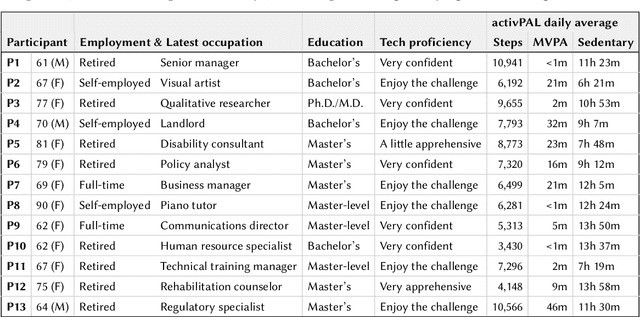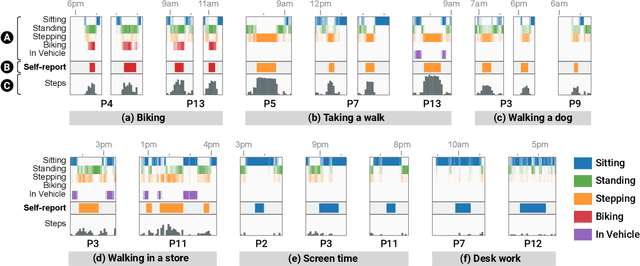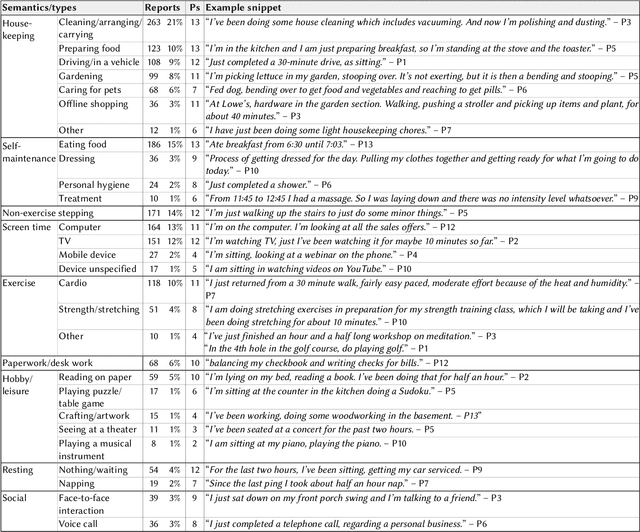Amanda Lazar
Investigating the Potential of Artificial Intelligence Powered Interfaces to Support Different Types of Memory for People with Dementia
Nov 19, 2022Abstract:There has been a growing interest in HCI to understand the specific technological needs of people with dementia and supporting them in self-managing daily activities. One of the most difficult challenges to address is supporting the fluctuating accessibility needs of people with dementia, which vary with the specific type of dementia and the progression of the condition. Researchers have identified auto-personalized interfaces, and more recently, Artificial Intelligence or AI-driven personalization as a potential solution to making commercial technology accessible in a scalable manner for users with fluctuating ability. However, there is a lack of understanding on the perceptions of people with dementia around AI as an aid to their everyday technology use and its role in their overall self-management systems, which include other non-AI technology, and human assistance. In this paper, we present future directions for the design of AI-based systems to personalize an interface for dementia-related changes in different types of memory, along with expectations for AI interactions with the user with dementia.
* 7 pages
MyMove: Facilitating Older Adults to Collect In-Situ Activity Labels on a Smartwatch with Speech
Apr 01, 2022



Abstract:Current activity tracking technologies are largely trained on younger adults' data, which can lead to solutions that are not well-suited for older adults. To build activity trackers for older adults, it is crucial to collect training data with them. To this end, we examine the feasibility and challenges with older adults in collecting activity labels by leveraging speech. Specifically, we built MyMove, a speech-based smartwatch app to facilitate the in-situ labeling with a low capture burden. We conducted a 7-day deployment study, where 13 older adults collected their activity labels and smartwatch sensor data, while wearing a thigh-worn activity monitor. Participants were highly engaged, capturing 1,224 verbal reports in total. We extracted 1,885 activities with corresponding effort level and timespan, and examined the usefulness of these reports as activity labels. We discuss the implications of our approach and the collected dataset in supporting older adults through personalized activity tracking technologies.
Taking Stock of the Present and Future of Smart Technologies for Older Adults and Caregivers
Mar 31, 2021Abstract:Technology has the opportunity to assist older adults as they age in place, coordinate caregiving resources, and meet unmet needs through access to resources. Currently, older adults use consumer technologies to support everyday life, however these technologies are not always accessible or as useful as they can be. Indeed, industry has attempted to create smart home technologies with older adults as a target user group, however these solutions are often more focused on the technical aspects and are short lived. In this paper, we advocate for older adults being involved in the design process - from initial ideation to product development to deployment. We encourage federally funded researchers and industry to create compensated, diverse older adult advisory boards to address stereotypes about aging while ensuring their needs are considered. We envision artificial intelligence systems that augment resources instead of replacing them - especially in under-resourced communities. Older adults rely on their caregiver networks and community organizations for social, emotional, and physical support; thus, AI should be used to coordinate resources better and lower the burden of connecting with these resources. Although sociotechnical smart systems can help identify needs of older adults, the lack of affordable research infrastructure and translation of findings into consumer technology perpetuates inequities in designing for diverse older adults. In addition, there is a disconnect between the creation of smart sensing systems and creating understandable, actionable data for older adults and caregivers to utilize. We ultimately advocate for a well-coordinated research effort across the United States that connects older adults, caregivers, community organizations, and researchers together to catalyze innovative and practical research for all stakeholders.
 Add to Chrome
Add to Chrome Add to Firefox
Add to Firefox Add to Edge
Add to Edge